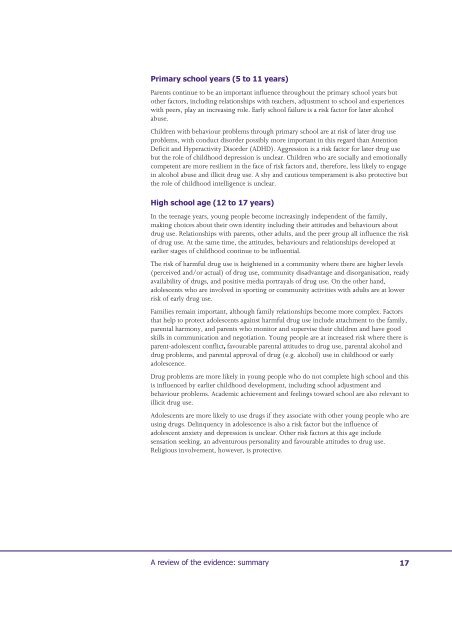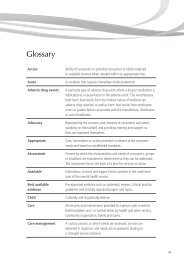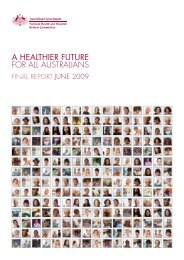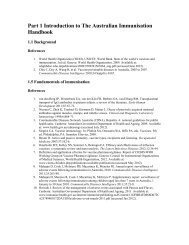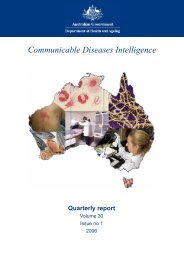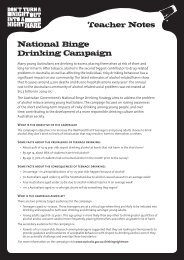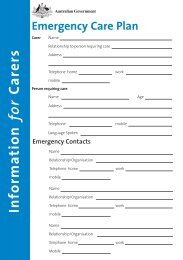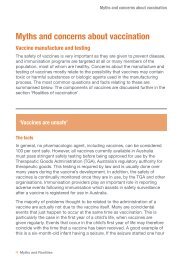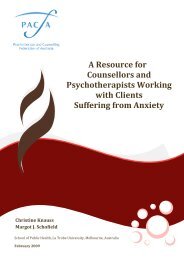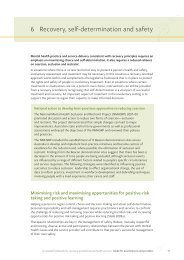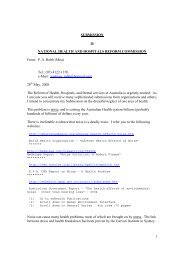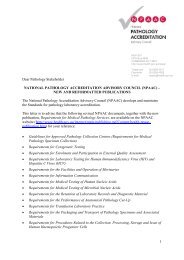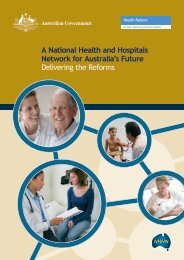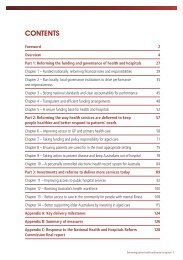Summary - Department of Health and Ageing
Summary - Department of Health and Ageing
Summary - Department of Health and Ageing
Create successful ePaper yourself
Turn your PDF publications into a flip-book with our unique Google optimized e-Paper software.
Parents continue to be an important influence throughout the primary school years but<br />
other factors, including relationships with teachers, adjustment to school <strong>and</strong> experiences<br />
with peers, play an increasing role. Early school failure is a risk factor for later alcohol<br />
abuse.<br />
Children with behaviour problems through primary school are at risk <strong>of</strong> later drug use<br />
problems, with conduct disorder possibly more important in this regard than Attention<br />
Deficit <strong>and</strong> Hyperactivity Disorder (ADHD). Aggression is a risk factor for later drug use<br />
but the role <strong>of</strong> childhood depression is unclear. Children who are socially <strong>and</strong> emotionally<br />
competent are more resilient in the face <strong>of</strong> risk factors <strong>and</strong>, therefore, less likely to engage<br />
in alcohol abuse <strong>and</strong> illicit drug use. A shy <strong>and</strong> cautious temperament is also protective but<br />
the role <strong>of</strong> childhood intelligence is unclear.<br />
<br />
In the teenage years, young people become increasingly independent <strong>of</strong> the family,<br />
making choices about their own identity including their attitudes <strong>and</strong> behaviours about<br />
drug use. Relationships with parents, other adults, <strong>and</strong> the peer group all influence the risk<br />
<strong>of</strong> drug use. At the same time, the attitudes, behaviours <strong>and</strong> relationships developed at<br />
earlier stages <strong>of</strong> childhood continue to be influential.<br />
The risk <strong>of</strong> harmful drug use is heightened in a community where there are higher levels<br />
(perceived <strong>and</strong>/or actual) <strong>of</strong> drug use, community disadvantage <strong>and</strong> disorganisation, ready<br />
availability <strong>of</strong> drugs, <strong>and</strong> positive media portrayals <strong>of</strong> drug use. On the other h<strong>and</strong>,<br />
adolescents who are involved in sporting or community activities with adults are at lower<br />
risk <strong>of</strong> early drug use.<br />
Families remain important, although family relationships become more complex. Factors<br />
that help to protect adolescents against harmful drug use include attachment to the family,<br />
parental harmony, <strong>and</strong> parents who monitor <strong>and</strong> supervise their children <strong>and</strong> have good<br />
skills in communication <strong>and</strong> negotiation. Young people are at increased risk where there is<br />
parent-adolescent conflict, favourable parental attitudes to drug use, parental alcohol <strong>and</strong><br />
drug problems, <strong>and</strong> parental approval <strong>of</strong> drug (e.g. alcohol) use in childhood or early<br />
adolescence.<br />
Drug problems are more likely in young people who do not complete high school <strong>and</strong> this<br />
is influenced by earlier childhood development, including school adjustment <strong>and</strong><br />
behaviour problems. Academic achievement <strong>and</strong> feelings toward school are also relevant to<br />
illicit drug use.<br />
Adolescents are more likely to use drugs if they associate with other young people who are<br />
using drugs. Delinquency in adolescence is also a risk factor but the influence <strong>of</strong><br />
adolescent anxiety <strong>and</strong> depression is unclear. Other risk factors at this age include<br />
sensation seeking, an adventurous personality <strong>and</strong> favourable attitudes to drug use.<br />
Religious involvement, however, is protective.


